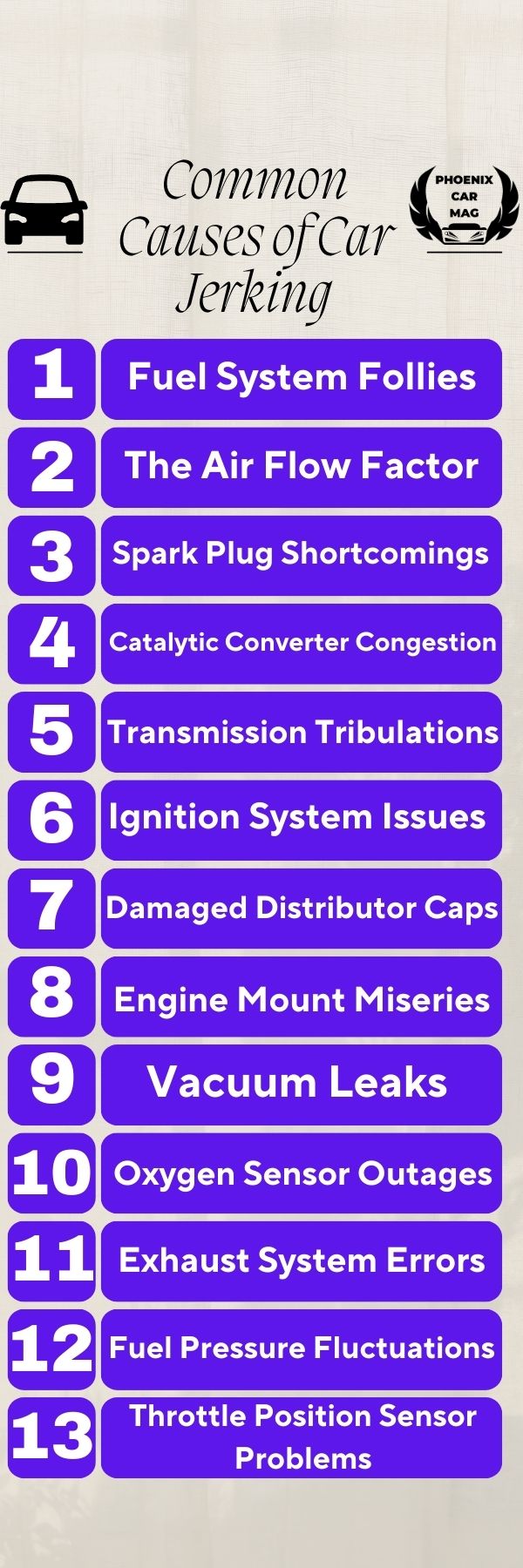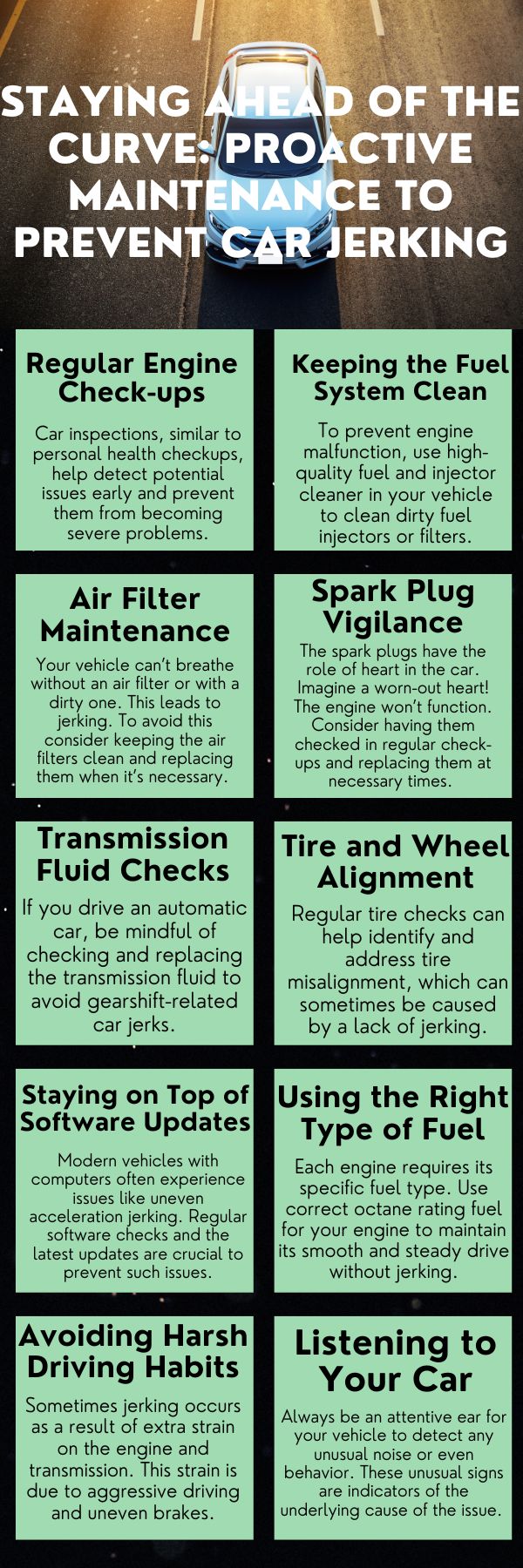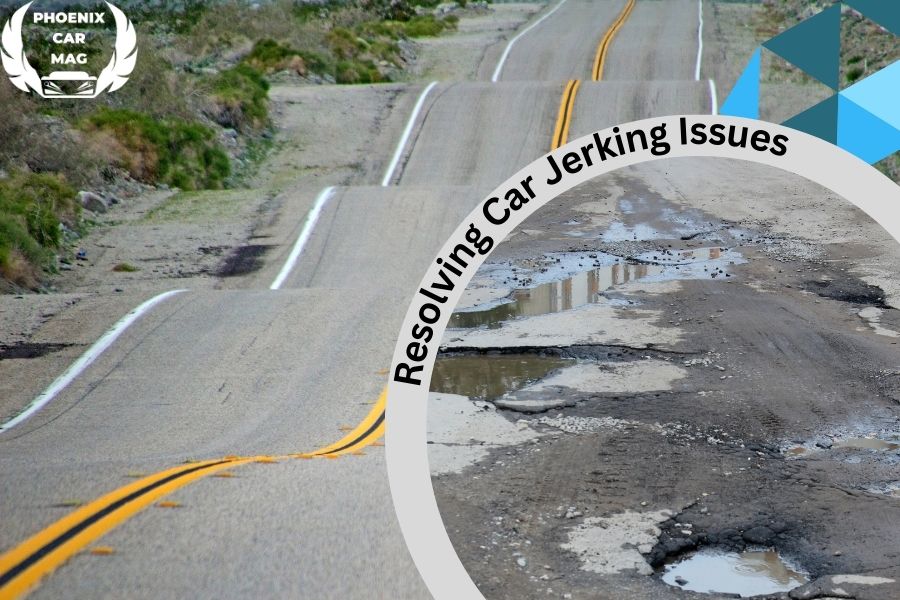Car Jerks When Accelerating at Low Speeds [My 2024 Solutions]
![an featured image about Car Jerks When Accelerating at Low Speeds [My 2024 Solutions]](https://phoenixcarmag.com/wp-content/uploads/2024/01/Car-Jerks-When-Accelerating-at-Low-Speeds-My-2024-Solutions.jpg)
Hi there. I’m Isaac V. Mace the founder of Phoenix Car Mag. I’m a seasoned vehicle specialist with lifelong experience in dealing with various vehicles and resolving their issues.
What made me write this article is the discomforting and concerning car jerks during acceleration. This incident occurs more noticeably at low speeds.
Just be aware that you can’t consider this just as a discomforting experience; it’s a vital issue that reflects the inner problems of your vehicle. Car jerks are unsettling, especially for new drivers who aren’t familiar with their vehicle’s internal system. But don’t worry! We are here to resolve this issue and before resolving we need to figure its cause out.
So why car jerk when accelerating at low speeds? When a car jerks during acceleration, I first think of a problem in delivery because it’s the most common reason. What’s the delivery issue? Simple! When fuel injectors are clogged or dirty, the necessary amount of required fuel isn’t delivered to the engine. As a result of this, sporadic bursts of power are delivered to the engine at the acceleration moment and you experience jerking.
The repair of this issue is straightforward. All you need to do is to clean or replace the injectors and see how the vehicle’s performance elevates.
You might also enjoy: Power Window Fuse: Location + Ultimate Guide [My 2024 Update]
13 Common Causes of Car Jerking
Since the car jerks in acceleration in many cases, I gathered a brief but complete list of its common causes. It’s worth mentioning that I’ve gained this information from several years of hands-on experience with various car models so it’s a reliable guide.
1. Fuel System Follies
A car jerk can be followed by a fuel system issue. It includes clogged injectors or dirty fuel filters. A car with a clogged fuel system is unable to maintain a smooth and steady drive.
2. The Air Flow Factor
The air filter is the engine’s breath and in case of clogging the engine struggles to breathe and function properly.
3. Spark Plug Shortcomings
Faulty or worn-out spark plugs confuse the engine and disturb its rhythm. This engine is similar to a drummer who missed the beat in a band. They both don’t know what to do!
4. Catalytic Converter Congestion
In case of a clogged catalytic converter, the exhaust flow is blocked. So the engine won’t function properly.
5. Transmission Tribulations
Transmission issues lead to uneven brakes and car jerks. This issue is more common in automatic vehicles.
6. Ignition System Issues
A malfunctioning ignition is a fairy start at a race. It disrupts the whole engine’s performance.
7. Damaged Distributor Caps
Moisture in the distributor causes a misfire. For a better understanding imagine you’re trying to make a fire with wet woods. You struggle with this issue more in cold weather conditions.
8. Engine Mount Miseries
Failing mounts make the engine do uneven and sudden movements.
9. Vacuum Leaks
This disturbs the balance of the air-fuel mixture and jerks and leads to car jerks.
10. Oxygen Sensor Outages
A faulty oxygen sensor disturbs the fuel mixture.
11. Exhaust System Errors
Issues of the exhaust system like a clogged pipe in the water system lead to jerking.
12. Fuel Pressure Fluctuations
The engine requires a consistent fuel flow, otherwise it won’t provide you with a smooth performance.
13. Throttle Position Sensor Problems
Throttle Position sensor malfunction leads to jerking as a result of improper air-fuel mixture.
According to the causes, you might know that each car jerk has its own story and underlying issue making it a complex issue to diagnose. We should first figure the reason out and then offer a solution.
Keep in mind that your vehicle is something beyond a machine. It’s the combination of components that work in an accurate harmony. Sticking to regular maintenance and being attentive to the car’s sounds and behaviors help prevent this issue because it’s always a better option to prevent rather than fix. However, when it comes to fixing, finding the root cause is the key.
You might also enjoy: What Is Suprastick – My 2024 Personal Guide To It
Decoding the Jerk: Advanced Diagnostics and Solutions for Your Car
As a result of working under various car hoods and dealing with similar problems, I realized that diagnosing the jerking root cause is a puzzling and daunting job. It requires a specialist who is good at observing, has greasy hands, and a bit of instinct.
Due to its complexity, I talk about my real-life experiences to spot a light on this issue. Whenever a car enters my help center due to jerking, first I do a throughout diagnosis to realize what is happening inside the car. The reason for jerking fits in a wide range of causes; from clogged fuel systems to tricky transmission issues.
In most cases, it turns out that the problem is clogged fuel injectors. The repair involves cleaning the injectors with quality cleaners or replacing them.
In some other cases, the issue occurs as a result of a clogged air filter or malfunctioning mass air flow sensor. You can replace the air filter by yourself but remember dealing with the mass air flow sensor is daunting and requires expertise and special tools.
Sometimes small components like spark plugs or ignition pit you in trouble. Replace them if they’re failing and see how it improves your car performance.
When it comes to transmission issues, I have to say that it’s confusing and tricky. In both automatic and manual vehicles you can resolve the issue by changing the transmission fluid. In case of persistence, you need to delve deeper into it.
You don’t expect this but sometimes computer glitches cause jerking. As the new vehicles are being computerized, try to update them to avoid headaches on the road.
It’s a wiser option to prevent the engine rather than fix it. So I’m discussing the maintenance tips alongside the repair process. To maintain your vehicle properly, try to do regular check-ups and use high-quality fuel. You should also be attentive to your car’s erratic or strange behaviors.
During years of experience and struggling, I realized that each car’s issues are unique for itself and it’s our job to reveal their story and resolve them.
I consider finding the cause of jerking as a satisfying experience not only for its complexity but also for being involved in the vehicle’s electronic and mechanic systems more than before.
See your vehicle for something beyond a combination of components. It’s a complex system that you should care about and sometimes be a detective to find its potential problems.
You might also enjoy: I Found 10 Reasons Why Your Car Battery Smoking [2023]
Staying Ahead of the Curve: Proactive Maintenance to Prevent Car Jerking
I’ve learned to always consider proper maintenance before repairing. Your car won’t give you a smooth drive just in case you fix its problem. It gives you a smooth steady drive when you prevent it from various issues. I provided a list of regular maintenance tips for you:
- Regular Engine Check-ups: It’s similar to health checkups that you do for yourself. Your car needs to be inspected for any signs of issues either. By doing this you detect each potential issue on its first step and prevent it from turning into a severe complex issue.
- Keeping the Fuel System Clean: Dirty or clogged fuel injectors or a dirty fuel filter disturb the engine’s function. To prevent this, use high-quality fuel and add injector cleaner to your vehicle.
- Air Filter Maintenance: Your vehicle can’t breathe without an air filter or with a dirty one. This leads to jerking. To avoid this consider keeping the air filters clean and replacing them when it’s necessary.
- Spark Plug Vigilance: The spark plugs have the role of heart in the car. Imagine a worn-out heart! The engine won’t function. Consider having them checked in regular check-ups and replacing them at necessary times.
- Transmission Fluid Checks: If you drive an automatic car, be mindful of checking and replacing the transmission fluid to avoid gearshift-related car jerks.
- Tire and Wheel Alignment: In some cases, there is no jerking! It’s just your tires misalignment. Consider having your tires regularly checked for any signs of misalignment.
- Staying on Top of Software Updates: As you know modern vehicles are equipped with computers. Computer glitches cause many issues like uneven jerking during acceleration. Check your software regularly and always install the newest software updates to prevent this issue from happening again.
- Using the Right Type of Fuel: Each engine requires its specific fuel type. Use correct octane rating fuel for your engine to maintain its smooth and steady drive without jerking.
- Avoiding Harsh Driving Habits: Sometimes jerking occurs as a result of extra strain on the engine and transmission. This strain is due to aggressive driving and uneven brakes.
- Listening to Your Car: Always be an attentive ear for your vehicle to detect any unusual noise or even behavior. These unusual signs are indicators of the underlying cause of the issue.
Regular maintenance is an essential thing to do; but not just for increasing the vehicle’s longevity. It gives us a smooth and enjoyable driving experience. It also reminds us to take care of our vehicles. So don’t hesitate to do regular maintenance as it ensures your safe and convenient drive on the road.
You might also enjoy: Engine Knock on Startup Then Goes Away – My 7 Prevention Tips
Navigating the Bumpy Road: My Insights on Resolving Car Jerking Issues
I’ve gathered valuable knowledge in my years of working with Phoenix Car Mag and encountering real-life experiences of car jerk issues. These cases sharpened my skills and deepened my knowledge about the car’s intricate connections and mechanic system. I thought of sharing this knowledge with you to shine a light on your journey.
I want to recall the case that the driver of the 2017 sedan was dissatisfied with his vehicle as it was jerking during acceleration. My first assumption was the faulty fuel system.
After further inspection, I diagnosed it as the clogged fuel injectors. Once I cleaned the fuel injector, the vehicle got its efficiency back and the problem was resolved.
Another case was the older model that has persistent jerking issues. The problem was both faulty spark plugs and dirty air filters. I resolved the issue by replacing the spark plugs and cleaning the air filter. This case taught me sometimes small but vital components can cause such significant issues.
I remember once I was struggling with a high-mileage vehicle’s jerking issue. I realized that it was happening because of the old transmission fluid.
It was unbelievable that it had never been changed till that moment. I did the vehicle a favor and changed its transmission fluid. Right after that, the car gained its normal efficiency. This experience is telling us to be attentive to our manufacturer’s manual.
When it comes to complex systems of vehicles, I can remember my challenging experience with a car that was jerking due to its faulty throttle control system. It took me time to diagnose the issue and resolve it by updating the vehicle’s software system.
Keep in mind that the jerk resolving process is not straightforward so you need to be patient and a bit talented. You can prevent car jerking with regular maintenance tips like air filter inspection, spark plug replacement, and transmission services.
However, remember cars are different from each other and some solutions may not work for some vehicles. You need to be familiar with your car’s system and understand its requirements to experience a smooth drive.
You might also enjoy: What Happens If You Unplug Idle Air Control Valve [2024] – My Personal Experience
Conclusion
Briefly, if you want to deal with your vehicle’s jerking issue, it’s important to be patient, preventive, and a bit detective. The Phoenix Car Mag taught me that it’s necessary to deepen your knowledge about the mechanics and electronic systems of modern vehicles. Sometimes you need to go further than obvious factors to find the root cause.
You can warranty your smooth drive on the road with regular maintenance, attentiveness, and proper interventions. Consider your car as your road companion and try to be informed of its needs to keep it in good health condition.
FAQs
- How do you fix a car jerking when accelerating?
You need to diagnose the root cause to fix it. For instance, you can resolve the issue by changing spark plugs, cleaning air filters, or cleaning fuel injectors. In case the problem persists, think of a more complex issue like the transmission fluid or electrical glitches and malfunctions.
- Why does my automatic car jerk when I accelerate at low speeds?
It occurs due to a few reasons. It might indicate a transmission issue like old fluid, or it may show clogged fuel injectors or dirty air filters. Sometimes all you need to do is do a single software update and experience the relief.
- Can transmission cause the car to jerk when accelerating?
Definitely. The transmission is there to control the vehicle’s speed. So transmission issues can lead to jerking. They include dirty transmission fluid, worn gears, or torque converter malfunction. Consider checking the transmission regularly to avoid these issues.
- Why does my car jerk when I press the gas?
This issue is a telltale sign of a fuel system issue or an ignition malfunction. Causes include dirty air filters, clogged fuel injectors, or worn-out spark plugs. The vehicle is unable to receive the proper mixture of air and fuel.
- Is car jerking a serious problem?
It’s possible. While being discomforting, jerking can also be threatening to your vehicle. So I suggest you address the issue promptly to avoid further damages and more costly repairs.
- Why does a Car jerk when accelerating with no check engine light?
The car’s jerking doesn’t necessarily illuminate the check engine light. It’s because of a minority of the problem. Due to this fact, the vehicle doesn’t detect it as a vital issue. These minor issues include slightly clogged fuel injectors or early steps of transmission issues. However, if you’re doubtful don’t trust the check engine light and have your car inspected for any potential problems.
- Why does the Car jerk when accelerating in first gear?
This issue only happens in manual cars and is a result of clutch issues or transmission problems. You can think of worn-out clutch, incorrect clutch use, or improper transmission fluid. In automotive cars, this problem is due to improper transmission fluid or torque converter malfunction. You can prevent this issue by using the clutch correctly and being attentive to regular maintenance.







![Brake Fluid Change: Costs + Signs + Everything [2024]](https://phoenixcarmag.com/wp-content/uploads/2024/01/Brake-Fluid-Change-Costs-Signs-Everything-2024-2-308x180.jpg)